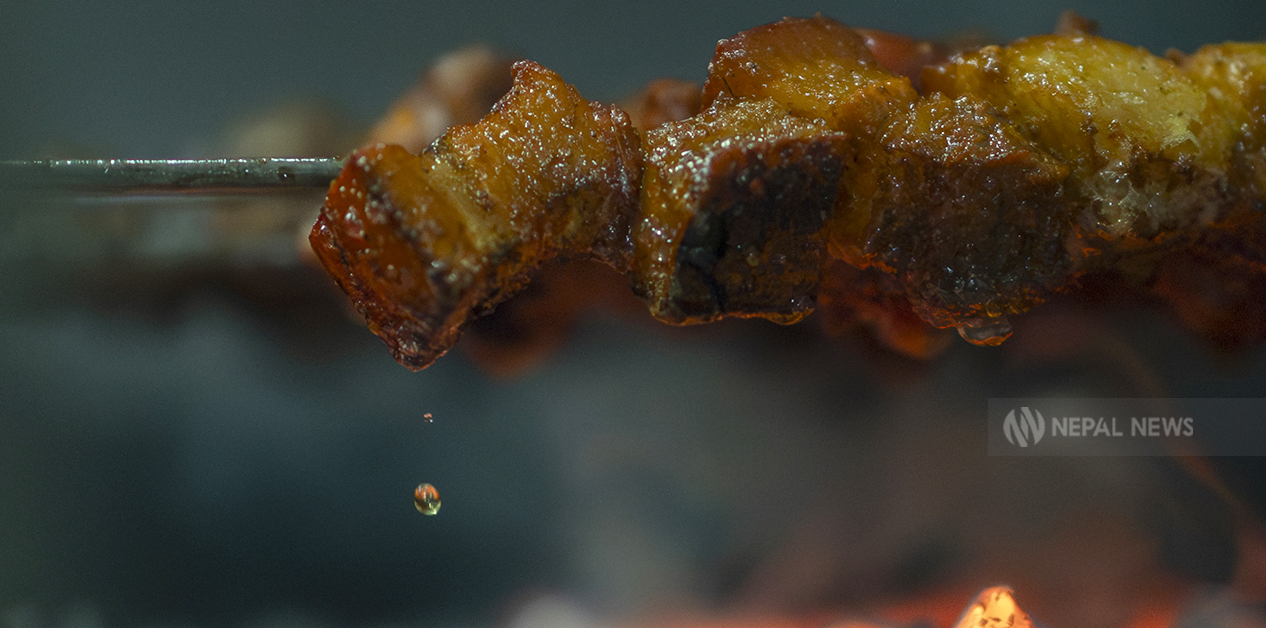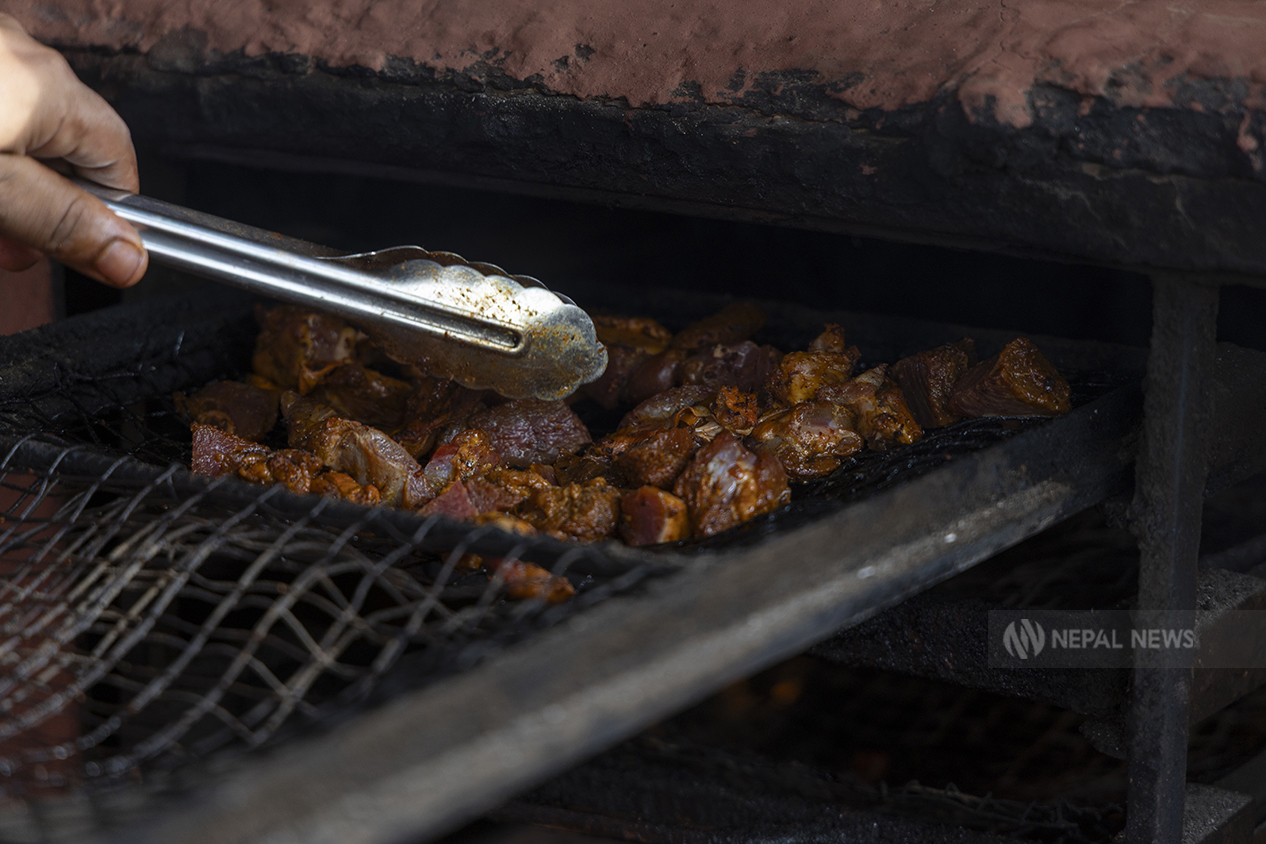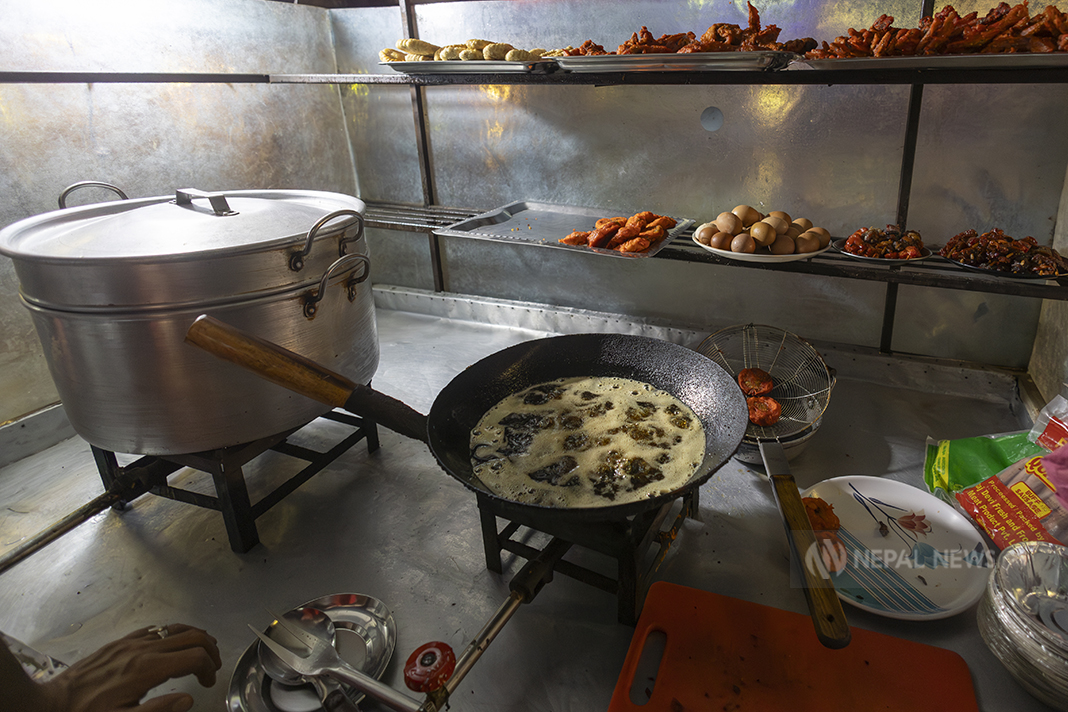
The rising consumption of fried foods is fuelling a public health crisis

KATHMANDU: On September 14, 2024, a team from the Department of Food Technology and Quality Control (DFTQC), during a monitoring visit to Prapti Food Products in Sinamangal, found substandard ghee in the industry’s storage room. According to the DFTQC spokesperson, Mohan Krishna Maharjan, the team found 30 liters of unlabeled boxed ghee, 30 kilograms of butter, and 50 liters of prepared ghee at the factory. The DFTQC issued a warning to the factory owner to improve the quality and then let them go.
When the department’s team went to monitor the Prasansa Collection and Refine Processing Center in ward 11 of Godawari Municipality, Lalitpur, an even more terrifying scene was observed. There, the owner was heating vegetable ghee in a rusty drum and selling it as “pure.”
On another occasion, when the department’s team visited Crunchy Fried Chicken Burger House in Sallaghari, Bhaktapur, the oil used for frying food was found to be of substandard quality. After finding oil that could be harmful to the public’s health, the department destroyed the cooked food and instructed the owner to appear at the DFTQC within five days.
According to the standards of the DFTQC, the TPM (Total Polar Materials) value of cooking oil that has been reused or is in use should not exceed 25. However, spokesperson Maharjan says that when the department monitored Balaju Burger House, the oil used for frying food had a TPM value of 36.5. At the Tribhuvan International Airport’s Burger House and Thakali Kitchen, the TPM value of 25 liters of oil ready for frying was found to be 33.
At The Burger House and Crunchy Fried Chicken in Bhaktapur, the oil was found to have been used repeatedly for frying food, and the oil used for frying was substandard. During testing at Daura Thakali in Old Sinamangal, the oil used had a TPM value of 26, and it was found that food was being fried again in oil that had been used once. “From October 23, 2024, to the mid-January of 2025, we monitored shops and factories and tested samples of food items,” says Maharjan.
The samples collected during the department’s periodic monitoring reveal that the quality of food prepared in restaurants and cafes is extremely poor. Even now, the condition of most eateries in urban areas is no different. On February 15, 2025, when the DFTQC monitored hotels, restaurants, sweet shops, and oil industries in districts outside Kathmandu Valley, it found that the oil used for frying was semi-processed, unlabelled, poorly stored, and reused repeatedly.
The quality of food cooked and sold in hotels, restaurants, snack shops, and open stalls is not only substandard, but it is also making public health risky. It is found that business owners use unlabeled and low-quality oil for cooking. Research on health even shows that oil heated once is used many times for cooking other food, which is causing a risk to the health of consumers.
Food fried in the same oil more than three times is extremely harmful to health. However, doing so has become common for many hotels, restaurants, and snack shops in the city. The DFTQC’s monitoring report, 2024/2025, reveals that from small shops to star hotels, food is fried repeatedly in the same oil. However, this problem is found more in small snack shops, stalls, hotels, and restaurants. Not only is substandard food sold in these hotels, restaurants, and shops, but the sanitation is also poor. Low-quality oil is also used in the food of hotels and restaurants on highways.

Recently, due to busy lifestyles, the number of people going to hotels, restaurants, and snack shops to eat is increasing. However, the fact that the quality of food cooked there is poor has been confirmed by monitoring. Section 16 of the Food Sanitation and Quality Act, 2024, states that low-quality food items should not be produced, processed, exported, imported, stored, transported, or sold. However, a look at the monitoring and testing reports of the DFTQC indicates that business owners are selling goods in violation of the law. Such food has increased the risk of non-communicable diseases. Cardiologist Dr Prakash Raj Regmi says, “It is fair to say that in recent times, there has been a flood of people coming to the hospital with health problems due to excessive use of oil and sweets in food.”
The World Health Organization’s STEPS Survey, 2019, says that more than 26 percent of adults in Nepal eat fast food. Fast food contains high amounts of harmful fat or trans fat.
The Nepal Dietary Survey 2019 shows that fast food and low-quality oil are used in excessive amounts in urban areas. Even regular cooking oil becomes trans fat when heated for a long time, which is considered risky for health. Trans fat has been found in the oil produced and used in Nepal. Vegetable ghee and various brands of oil have high amounts of trans fat.
Trans fat is a harmful fat that is formed when vegetable oil is made into solid vegetable ghee through an industrial process using margarine. It is used to make food last longer and to improve its taste and texture. However, the WHO has classified it as a dangerous fat. It increases heart attacks, high blood pressure, cancer, and diabetes. Due to trans fat, the number of people affected by non-communicable diseases like asthma, heart and kidney disease, diabetes, paralysis, and cancer is increasing in Nepal every second.
Junk food increases non-communicable diseases
The burden of non-communicable diseases is increasing in Nepal. According to the STEPS survey conducted in 2019, at least 71.1 percent of total deaths were due to non-communicable diseases, which was 63.7 percent in 2015. Cardiovascular Disease (CVD) accounts for 24 percent of the total death rate, chronic lung diseases for 16.3 percent, and cancer for 11.9 percent.
With the help of the WHO, the Ministry of Health and Population, and the Nepal Health Research Council (NHRC), a community-centered survey was conducted from 2016 to 2018. According to that survey, published in 2019, 71 percent of deaths in Nepal were due to non-communicable diseases.
According to government data, among non-communicable diseases, the first cause of death is CVD, the second is respiratory, and the third is cancer. Thirty years ago, the number of deaths from infectious diseases was surpassed by non-communicable diseases. Dr Sharad Onta, a public health expert, says that the increasing prevalence of non-communicable diseases in Nepal in recent years is a matter of concern. “Unhealthy lifestyle and excessive consumption of trans fat-rich fast food are increasing diseases like high blood pressure and diabetes,” he says.
According to Onta, since non-communicable diseases are related to lifestyle, they can be reduced only by paying attention to diet and physical exercise. Developed countries, with old infectious diseases completely under control, are now focused on the prevention and treatment of non-communicable diseases. However, Wanta says that Nepal is facing the double burden of both infectious and non-communicable diseases.
Phanindra Baral, head of the Non-Communicable and Mental Health Branch of the Ministry of Health and Population, says that since non-communicable diseases have increased recently, they have formulated a strategy to establish treatment centers at the provincial level to make their treatment easier. “After non-communicable diseases increased due to inedible food, we are taking steps to control them,” he says.
Heart disease becomes the main cause
There are around 6 million heart disease patients in Nepal. Due to this disease, 46,399 Nepali citizens die annually. Among those who died from non-communicable diseases, the highest number were from heart disease. According to doctors, food made from bad fat or trans fat, which is formed after heating fat many times, has a high chance of causing a heart attack.
Dr Prakash Raj Regmi says that bad fat is the main reason for heart disease and heart attacks in young people recently. “Ready-made and packaged foods, biscuits, instant noodles, beverages, chocolates, cakes, and cookies, among other things available in the market, are trans fat-rich junk foods. Trans fat produces bad cholesterol and increases the possibility of heart valves getting blocked. To prevent and protect from heart and heart attack, trans fat should be controlled,” says Dr Regmi.

Sweets, beverages, and fatty substances have increased non-communicable diseases. Sweet foods include not only sugar but also processed carbohydrates, flour, and dishes made from flour.
Numerous studies have linked the excessive consumption of carbohydrates, processed carbohydrates, and sugar to obesity. Research also indicates that sweets are more dangerous for the heart than oily foods. According to Dr. Regmi, trans fat is a significant contributor to the rising number of heart-related deaths, particularly among young people who frequently eat ready-made food from outside. He notes that these foods are the reason 50 percent of young heart attack victims die.
No standards, no monitoring
A study conducted jointly by the WHO and the NHRC in 2022-23 revealed the facts about trans fat consumption, status, and control in Nepal. The study also mentioned that food is cooked and fried repeatedly in the same oil, that there is no label for cooking and selling, that cheap oil is used, and that the amount of trans fat is high in the sold goods. After the study, the standard for the use of industrial trans fat (2024) was also made. The standard states that the fat in food should not be more than two percent.
Despite existing standards, there is no regular monitoring to check the amount of trans fat in food sold at restaurants, hotels, sweet shops, and in packaged products. Although the standards mandate that every food item must be labeled with its trans fat content, consumer rights activist Bishnu Timilsina states this labeling is not found in the market.
Timilsina points out, “While the amount of burnt fat is tested, its healthiness is not.” He also notes that oil used for cooking and frying in star hotels is later found to be used in smaller snack shops and street stalls. He concludes that even though prepared and cooked foods are sold widely, their quality is poor and there is no effective monitoring.
Shrestha, a spokesperson for the DFTQC, admits that the food cooked and sold in snack shops, hotels, and restaurants cannot be tested regularly. He said that due to the lack of regular monitoring, there are challenges in the use and control of inedible items including trans fat. However, a standard for the control of sweet substances has not been made yet.
The United Nations has recognized the epidemic of non-communicable diseases as a pandemic, including it as part of the sustainable development goals. The stated aim is to prevent and treat premature deaths from these diseases while promoting mental health and well-being.
The government has also made a multi-sectoral action plan for the prevention and control of non-communicable diseases. A non-communicable disease management committee has been formed under the chairmanship of Health Minister Pradip Paudel to reduce the risk of non-communicable diseases. Similarly, Baral, the head of the non-communicable and mental health branch of the same ministry, says that the WHO has already prepared a draft of a comprehensive strategy to fight against non-communicable diseases in the South-East Asian region.